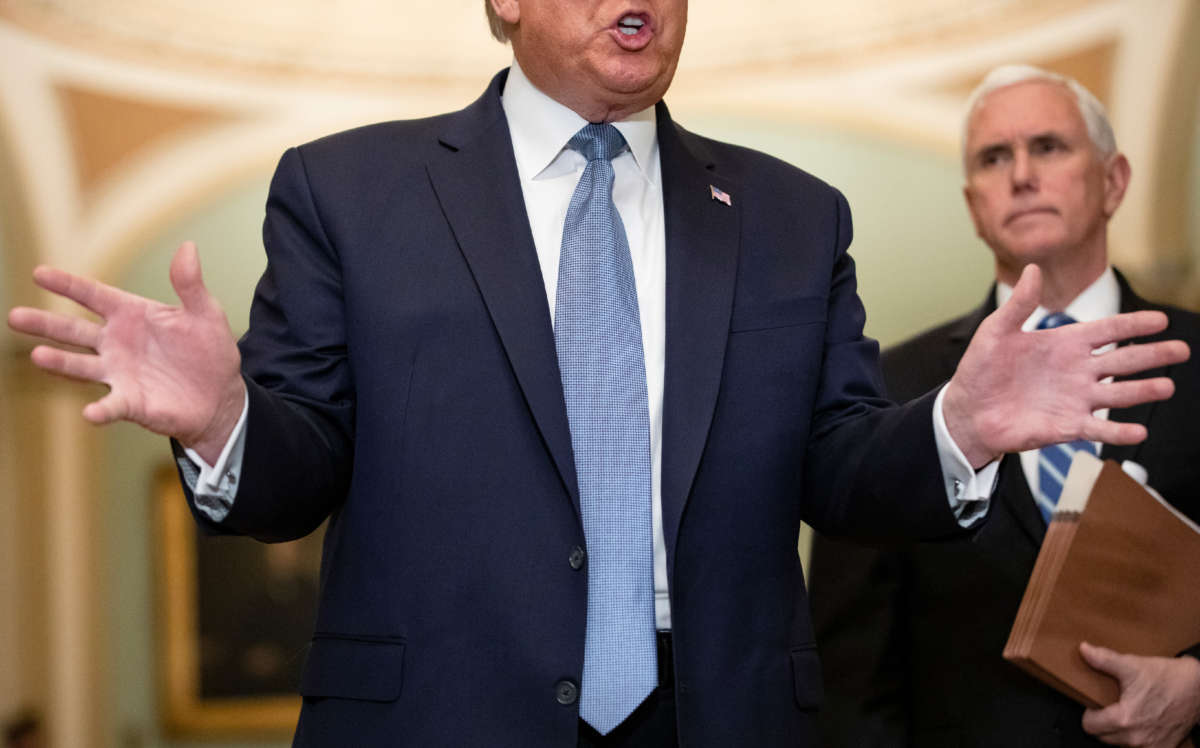President Donald Trump tweeted on Tuesday his belief that Vice President Mike Pence has the ability to reject votes within the Electoral College, a power that the office of the vice president doesn’t actually have according to the U.S. Constitution.
The tweet from Trump heavily implied that he’s hopeful Pence will employ such a strategy in order to overturn the 2020 presidential election results, which show that President-elect Joe Biden won the race.
“The Vice President has the power to reject fraudulently chosen electors,” Trump wrote in his tweet on Tuesday.
The Vice President has the power to reject fraudulently chosen electors.
— Donald J. Trump (@realDonaldTrump) January 5, 2021
Trump’s tweet echoed sentiments he expressed on Monday evening while attending a campaign rally in Georgia. During that event, Trump vaguely implied that he was hopeful that Pence would overturn the results.
“I hope Mike Pence comes through for us, I have to tell you,” Trump said at the rally. “Of course, if he doesn’t come through, I won’t like him as much.”
Pence’s aides in recent days have stated that he won’t deviate from his duties in counting the Electoral College votes. “He will follow the law and Constitution,” a person familiar with the situation said to CNN.
Neither the Constitution nor federal laws surrounding the Electoral College grant the vice president — who also serves as president of the Senate — the ability to reject electors’ votes for the next president or vice president.
The 12th Amendment of the Constitution states that “the President of the Senate shall, in the presence of the Senate and House of Representatives, open all the certificates and the votes shall then be counted.” It adds that “the person having the greatest number of votes for President, shall be the President, if such number be a majority of the whole number of electors appointed.”
There is no provision in the amendment, or elsewhere in the Constitution, that grants the president of the Senate/vice president the power to overturn or reject electors’ votes in the Electoral College.
Biden received a majority of Electoral College votes in the presidential election held in November, attaining 306 votes to Trump’s 232.
Federal law reiterates that the vice president’s role in counting the votes is largely ceremonial. The vice president isn’t even the one who counts the votes, but rather, two officers from each house in Congress handle those duties, with the vice president eventually announcing the results.
The vice president calls for objections after the vote count is announced, and if objections are made, both houses convene separately to discuss them. Rejecting any number of electors’ votes requires both the House of Representatives and the Senate to concur, something that isn’t likely to happen since each house is controlled by a different political party.
After consideration for rejecting the electors’ ballots is made, both houses reconvene and the vice president announces the new results. If there is no consensus on rejecting the electoral college votes, the original results stand.
The vice president has neither the ability to reject electors’ votes on his own, nor the ability to raise his own objections to the outcome of the Electoral College.
Join us in defending the truth before it’s too late
The future of independent journalism is uncertain, and the consequences of losing it are too grave to ignore. To ensure Truthout remains safe, strong, and free, we need to raise $43,000 in the next 6 days. Every dollar raised goes directly toward the costs of producing news you can trust.
Please give what you can — because by supporting us with a tax-deductible donation, you’re not just preserving a source of news, you’re helping to safeguard what’s left of our democracy.
